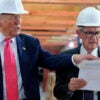Appointing a new CEO to head U.S. international broadcasting is one of the many tasks on the list for the Trump White House.
In part thanks to the snail-paced confirmation process orchestrated by Senate Democrats, the administration’s to-do list is still lengthy and the presidential appointment of a broadcasting CEO appears to be languishing.
Yet, getting the new CEO in place is the first, necessary step to improving the functions of the $750 million broadcasting complex under the Broadcasting Board of Governors that serves as the U.S. government’s primary outreach to citizens around the world—a major tool of U.S. public diplomacy.
This complex includes Voice of America as well as the semi-governmental Radio Free Europe/Radio Liberty and the Middle East Broadcasting Network, among others.
It is well established by now in study after study, including reports by the General Accounting Office, that the Broadcasting Board of Governors cries out for reform.
Among the long-needed reforms are: streamlining the management, better handling of human resources, fixing the duplication of language services, investments in new technology, enhancement in overall professionalism, and fulfilment of the broadcasters’ charter.
Legislation signed into law by President Barack Obama last December has given the Trump administration a rare opportunity to advance that reform. In addition, on March 13, President Donald Trump himself signed an executive order “to reorganize government functions and eliminate unnecessary agencies.”
So in order to advance this process, what kind of qualifications should the Trump administration look for in a candidate for the top job?
Here are four:
- A CEO who has demonstrated success in managing a large and complex bureaucracy. The Broadcasting Board of Governors is nothing if not complex, with multiple broadcasting entities, sometimes overlapping service areas and missions, and entrenched bureaucracy already in place. It also has some difficult stakeholders—the chief being the White House, the State Department, and Congress.
- Someone who is prepared to undertake major structural reforms and who can provide a set of fresh eyes and an open mind. In other words, someone not vested in the status quo.
- Someone with a solid grasp of the mission of U.S. international broadcasting and experience of the way the media works. In addition, he or she should have a substantial understanding of U.S. foreign policy and the importance of U.S. public diplomacy, of which U.S. international broadcasting is a part.
- Someone who has the trust and backing of the president and the National Security Council to make the agency perform up to its potential.
Finally, it might be added, the presidentially appointed CEO of U.S. international broadcasting should be someone with nerves of steel. Running this agency has proven a stiff challenge for managers in the past. Reforming it will require a steady hand at the till.
































